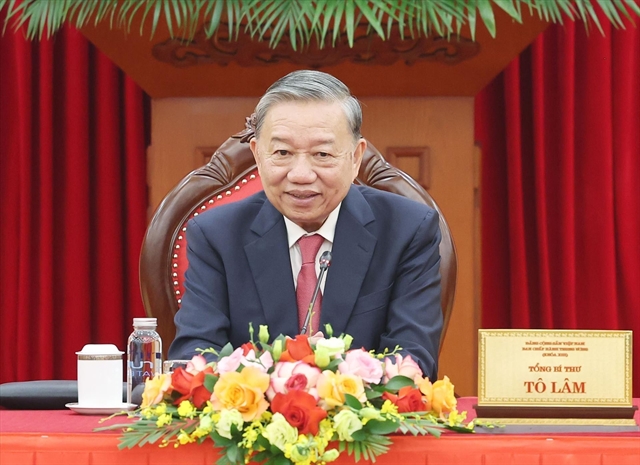 Politics & Law
Politics & Law

 |
| Chairman of the Việt Nam General Confederation of Labour Nguyễn Đình Khang clarifies several issues raised by NA deputies. — VNA/VNS Photo Minh Đức |
HÀ NỘI — The 7th session of the 15th National Assembly (NA) continued with a focus on the revised Trade Union Law on Tuesday, with the majority of deputies agreeing on the need to enhance the role of grassroots unions and maintain the two per cent funding level.
Deputy Nguyễn Phi Thường from Hà Nội stressed that grassroots trade unions have been operating inefficiently and in confused ways, so their voice within enterprises remains muted, while their capacity for negotiation, dialogue, representation and protection is still lacking.
Thường attributed these limitations to a variety of things, including the absence of clear and specific legal regulations. The current draft law's general regulations on the rights and responsibilities for all levels and types of trade unions are neither reasonable nor scientific.
The deputy emphasised the need to provide trade unions with a mechanism to exercise their rights and responsibilities as stipulated in the draft law. Currently, grassroots trade union officials are salaried by enterprises and are constantly under pressure from employers, making it challenging to ensure equality in their activities.
Therefore, it is necessary to legalise a mechanism to make trade unions more independent from employers.
He also proposed that the law should specifically require enterprises with a thousand or more employees to have at least one full-time trade union official.
The Việt Nam General Confederation of Labour should develop appropriate salary scales and tables to encourage trade union officials.
Some NA deputies suggested that the draft law should include responsibilities of employers and local authorities and bosses should actively collaborate with trade unions to promote union membership.
Discussing trade union fees, NA deputies strongly agreed on maintaining the two per cent trade union funding.
Deputy Nguyễn Thị Việt Nga from the northern province of Hải Dương supported the regulation that requires agencies, organisations and enterprises to contribute two per cent of the salary fund which serves as the basis for calculating social insurance for employees.
She noted that this practice had been stable and long-standing without significant issues, but she added that the distribution ratio of trade union funds should be transparent.
“To enhance the allocation of trade union funds for grassroots trade union activities, which directly support workers' lives, I believe there should be flexibility in specifying the distribution ratio. It should be defined as 'minimum' and 'maximum' percentages,” she said.
Supporting this view, Deputy Nguyễn Phi Thường from Hà Nội stated that continuing to maintain the two per cent trade union funding would be appropriate. This was crucial for ensuring that trade unions remain proactive and independent in their organisation and activities at the grassroots level.
Deputy Âu Thị Mai from the northern province of Tuyên Quang emphasised the need to provide sufficient resources to ensure effective representation, care and protection of workers' legitimate rights and interests.
However, to ensure the effective use of trade union funds, Mai suggested that the drafting committee carefully consider the regulations. To achieve high transparency and accountability in financial disclosure, the annual financial reports should be presented at general meetings of trade union members, allowing them to review and discuss as necessary. — VNS




